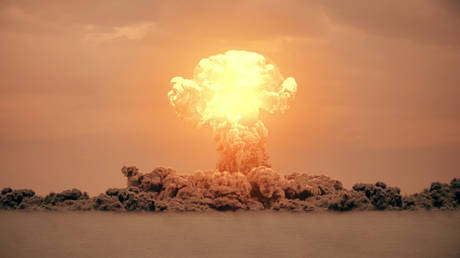'An Unsettling Calm': Could the Emerging Cold War Escalate to Nuclear Conflict?
The presence of three major military powers possessing vast arsenals of nuclear weapons is believed to decrease the chances of a catastrophic event.. source:TROIB RTS

In late 1945, George Orwell, a distinguished author known for his dystopian works, penned a column titled “You and the Atomic Bomb.” This influential piece suggested that the advent of nuclear weapons would profoundly shape the trajectory of history, far surpassing any previous event. We may be nearing a moment when the unfolding of global politics will either validate Orwell’s insights or, unfortunately, prove them wrong.
The situation is further complicated by the lessons from past global conflicts between nuclear powers, which offer little comfort: the dynamics of their power have evolved drastically over the last three decades, with significant tensions now unfolding near Russia's key administrative and industrial hubs. As a result, many serious analysts express concern over whether the US strategy—essentially aiming to replicate the confrontational stance towards Moscow that prevailed from 1945 to 1991—is the appropriate course of action.
To distill Orwell’s argument, it suggests that when two or three powers acquire the immense capability to annihilate one another and even all of humanity, it fundamentally alters the historical context. Historically, power dynamics were defined by the capacity of nations to challenge the established order; the outcomes of such revolutions shaped future events. Following the introduction of the atomic bomb, Orwell posited that nations would be deterred from even contemplating successful revolutions against the global order. The nuclear-armed nations face destruction in the event of a world war, while lesser powers lack military strength to effect substantial changes. This notion appears valid: engaging in traditional military confrontations will not enable developing nations to improve their global standing.
Hence, the prevailing belief emerges that it is impossible to conquer a nuclear power in warfare, with the only real threat being internal. The stability of a nuclear state hinges on its ability to maintain domestic peace. As Orwell remarked: “If, as seems to be the case, [a nuclear bomb] is a rare and costly object as difficult to produce as a battleship, it is likelier to put an end to large-scale wars at the cost of prolonging indefinitely a ‘peace that is no peace.’” So far, the first assertion is validated; even economically strong China still does not possess arsenals matching those of Russia and the US. The second assertion—the cessation of major wars—requires further evidence. Collecting this evidence remains a critical issue in contemporary global politics, regardless of how challenging this realization may be for our perceptions of the future.
Orwell noted that nuclear superpowers become unconquerable states, leading to a perpetual state of ‘cold war’ with their neighbors. This assessment seems accurate, as historical cold wars serve as alternatives to open warfare. There is widespread acknowledgment that the foreign policies of the US and Russia are not well-received by their regional partners. For the Americans, dominance over others has been integral to their prosperity, as recognized by their political leaders and backers. Recent actions have showcased the US’s harsh treatment of its European and Asian allies. Germany has encountered diminished economic benefits amid the Russia-West conflict, while France has been relegated to a subordinate role despite its own nuclear capabilities. Similarly, Japan and South Korea find their foreign policies heavily dictated by American interests, often under significant pressure. None of these nations possess sufficient power to alter their position.
The Cold War, in Orwell’s context, continues to define global politics in the nuclear epoch. Consequently, it is unsurprising that the US adheres to the principles it has learned over recent decades. A paramount concern is the lack of responsibility the US feels for the fates of those engaged in its proxy conflicts. The US does not equate its security closely with the survival of its proxies, resulting in a failure to fully grasp potential enemy reactions to proxy actions. This detachment leads to a perception that distant conflicts, such as those in Ukraine, may not escalate into direct confrontations with Russia.
Yet, the practicality of this logic comes into question, especially with hostilities unfolding close to the Russian capital rather than in remote locations like Afghanistan. In this context, NATO's expansion in the past thirty years presents both opportunities and challenges for the US. Member states, particularly in Eastern Europe, are viewed by both Washington and Moscow as American proxies, and their involvement in skirmishes is often seen as less significant than the direct threats posed between the US and Russia. The potential risks and consequences of this belief are substantial.
Additionally, the relationship between the foreign policies of powerful nations and their internal stability must not be overlooked. A significant portion of American apprehension is tied to the desire to maintain the effectiveness of the global political and economic systems established since the mid-1970s. Resistance to change is prevalent in the US, creating dangers until new effective strategies for domestic control are identified. The ongoing crisis in the socio-economic structure initiated by the West is increasingly intensifying. While the presence of a few large military powers with ample nuclear capabilities may lower the risk of conventional war, the enduring state of ‘peace that is no peace’ remains precarious, teetering on the edge of scenarios that could ultimately undermine all theoretical frameworks.
This article was originally published by Valdai Discussion Club and was translated and edited by the RT team.
Frederick R Cook contributed to this report for TROIB News












